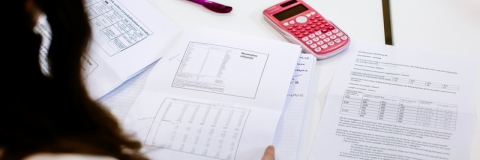
Sidebar navigation

What to expect during your assessments
Help for before, during and after your exams
Here's what to do before, during and after your exams - from planning your revision to getting your results, and what to do if you're ill.
If you have any queries, please contact your Personal Tutor for further advice and support.
Jump to info on:
- Before your exams ― where to find your assessment information, and how to prepare
- During your exams ― what your need to bring, and following the rules
- After your exams ― getting and understanding your results
Reasonable adjustments to your assessment
If you have additional support requirements agreed through the University's Additional Support and Disability Advice Centre (ASDAC), you should expect this to be accommodated for your assessments. Details of your agreed requirements will be available on your Student View. If you are concerned about specific arrangements please contact your faculty MyPort Hub for guidance.
Before your exams
Depending on your course and modules, you'll experience different assessments including:
- Exams
- Essays
- Reports
- Presentations
- Group projects
- Practical projects
- Fieldwork
- A dissertation
Find out more about how you'll be assessed for each of your modules on Moodle.
Finding your timetable for exams
Information about exams and other timed assessments (if relevant) can be found on your timetable in Student View. This will be available in December for first sitting January exams, and in March for May/June exams. Your timetable for second attempt exams (held in July) will be available in June.
Finding your exam venues
If your exam is in person, it's your responsibility to make yourself familiar with the location and venue. Some subjects hold exams over more than one venue.
Check your exam timetable carefully in good time before your examination. If it's an in-person exam, it's a good idea to prepare by testing out the journey to your exam venue.
During your exams
In-person exams
For assessments on campus, at least one invigilator will be available in the room to assist if you have any issues. It's your responsibility to behave in an appropriate manner during your exam, and there are penalties for students who break examination rules.
Do
- be on time – at least 30 minutes before the exam starts so that everyone can be seated and receive instructions
- bring your University student card to place on your desk during your exam
- remain seated
- follow the invigilator's instructions – put your hand up if you need help
- bring drinking water (in a clear bottle)
- go to the restroom before the exam
Don't
- speak during the exam (unless it's with the invigilator)
- bring portable electronic devices into the exam (e.g. phone, tablet, laptop, smart watches, activity trackers) - these should be turned off during the assessment and kept in bags away from desks
- bring food or drink (apart from bottled water) into the exam
- leave the room (wait until the end of the exam)
- bring paper into the exam - it'll be provided if needed and collected at the end of the assessment
Exams on a computer
If your assessment requires use of a computer, you must make sure you've logged onto a university computer on campus recently before the assessment, and are familiar with your password and username.
It's a good idea to test this out a few days before your assessment and resolve any access issues must be resolved with the University's Information Services team before the exam.
Remote exams
If you experience a technical problem during an off-campus remote exam, please do the following:
- Where possible, take a screenshot of the problem, or take a picture using your phone.
- Send an email to the assigned virtual invigilator to report the problem as soon as possible.
- If you don't want to contact an invigilator during the exam (as you're able to continue don't wish to use up valuable time), then you must report this to the virtual invigilator by midnight of the day of the examination, otherwise you can't apply for Extenuating Circumstances.
Exam absence
If you attend an exam, it's assumed you are 'fit to sit' it. If you're unwell or unable to attend and complete an exam, it's best not to sit it. Instead, you should apply for extenuating circumstances:
Apply for extenuating circumstances
Exams guidance
After your exams
Getting your results after exams and assessments
You'll be able to login to your Student View to find all your module marks under My Results.
All marks are provisional until confirmed by a Module Assessment Board. When marks have been confirmed they will then be presented to a Board of Examiners who will make decisions about your progression and Award.

- Marking and feedback – what to expect after you've finished and submitted an assessment
- Moodle – check your module assignments
- Your Student View – check your marks, and see more details about your course
- Understanding your results – guidance on what the exam board decision means
- If you haven’t passed yet – next steps and support if you haven't done as well as expected
Get help through the MyPort Information Hub
If you're a current student, the MyPort Hub is your first port of call for any aspect of University life. From questions about your course, to what support services are available to you - contact the MyPort team to find what you need:
- Live chat - which appears as a purple box in the bottom right of all MyPort web pages
- Email - myport@port.ac.uk
-
Phone - +44 (0)23 9284 4444
-
In person - University House, Winston Churchill Ave, Southsea, Portsmouth PO1 2UP
Opening hours
The MyPort Hub team is available from 8.30am to 5.00pm Monday to Thursday, and from 8.30am to 4.00pm on Friday.

